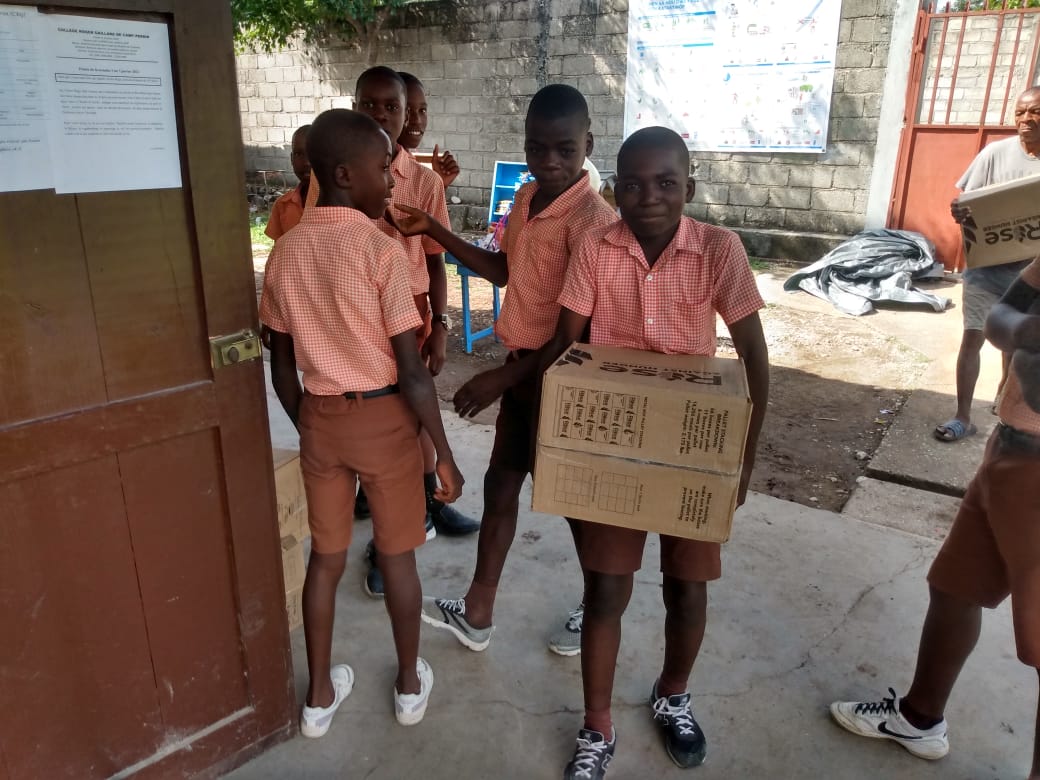
HAITI: Food shipment supports more than 3,700 families after earthquake
Families across several Salesian programs and educational centers have better nutrition thanks to rice-meal shipment from Rise Against Hunger.
NEW ROCHELLE, NY (April 25, 2022) More than 3,700 families across several Salesian programs and educational centers in Haiti had access to better nutrition thanks to a partnership between Salesian Missions, the U.S. development arm of the Salesians of Don Bosco, and Rise Against Hunger, an international relief organization that provides food and life-changing aid to the world’s most vulnerable. In the second half of 2021, two shipments were sent to Haiti to support nutritional efforts after the devastating 7.2-magnitude earthquake on Aug. 14 killed more than 2,000 people and left thousands injured and homeless.
Families connected to Notre Dame du Rosaire Parish and Saint Ann Parish, along with students from Fondation Vincent and Don Bosco Lakay in Cap-Haïtien and in Port-au-Prince, were among the recipients. Don Bosco Lakay has specialized facilities depending on the type of assistance needed. At Foyer Lakay, children live as a family for a period of four years until the completion of their apprenticeship in a technical profession. The Lakay Program for Street Children provides shelter and educational services for street children in Cap-Haïtien and Port-au-Prince. There are also vocational training programs where youth are able to study and gain the skills needed for long-term employment.
Don Bosco Lakay in Cap-Haïtien is also in the planning process to open eight new departments including IT, electricity, sewing and tailoring, welding, motor mechanics, construction, and cosmetology. These courses will be targeted toward at-risk youth from the neighboring City-Champin.
One of the recipients of the food donation was a young man named Jonas Joseph, who goes by the nickname Ti Djo. He is 14 years old and was born in Shada, the largest slum in Cap-Haïtien. His mother died giving birth to him, and his father refuses to accept him as his son. He was raised by his grandmother, who lives far below the poverty line and cannot buy daily meals. As the situation grew worse, she sent Ti Djo into domestic service.
Ti Djo experienced the worst moments of his life. He lived with little sleep and was responsible for everything in the house. He also faced physical abuse from the family. It became too much for him and he left to live on the streets.
One day, an educator from Don Bosco Lakay befriended Ti Djo. Eventually, Ti Djo went into the Don Bosco Lakay program where he is taking welding classes.
Paulin Iguène, director of Don Bosco Lakay said, “Ti Djo used to be weak but now he is getting strong, and he especially likes Rise Against Hunger food. Ti Djo is smiling, jovial and engaged. He is also happy because we were able to get in contact with his grandmother who is still alive.”
Salesian missionaries began working in Haiti in 1935 in response to the Haitian government’s request for a professional school. Since then, Salesian missionaries have expanded their work to include 11 main educational centers and more than 200 schools across the country.
Each of the main centers includes a number of primary and secondary schools, vocational training centers, and other programs for street children and youth in need. Salesian programs are located throughout Haiti, including in the cities of Port-au-Prince, Fort-Liberté, Cap-Haïtien, Les Cayes and Gressier. Today, Salesian missionaries in Haiti provide the largest source of education outside of the Haitian government with schools providing education to 25,500 primary and secondary school students.
###
Contact: [email protected]
